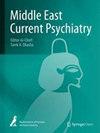Characteristics and management of patients with substance use disorders referred to a consultation-liaison psychiatry service in Lebanon
IF 1.6
Q3 PSYCHIATRY
引用次数: 0
Abstract
Abstract Background This study explores the characteristics and management of individuals with substance use disorders (SUDs) who were referred to the consultation-liaison psychiatry (CLP) service in a tertiary care center in Lebanon. As part of the Consultation-Liaison at the American University of Beirut (CLAUB) analysis, we conducted a retrospective record review of patients referred to our CLP service between February 2019 and May 2020. We assessed differences between SUD and non-SUD consults using chi-square analysis, Fisher’s exact test, or Mann–Whitney U test, as appropriate. Results Of 1475 patients, 278 (18.8%) received a diagnosis of SUD. They were mostly males (73.7%) with an average age of 38.8 years. The most used substances were alcohol (60%) and cannabis (28.4%). Compared to non-SUD consults, patients with SUDs were more likely to be males (odds ratio OR = 3.18, p < 0.001) and to get intubated during admission (OR = 1.81, p = 0.048). Predictors of intensive care unit admission in patients with alcohol use disorder included pulmonary or endocrinological disease, benzodiazepine use disorder, and days until CLP referral. Conclusions The results of this study highlight the high prevalence of alcohol use among individuals with SUD referred to the CLP service. Additionally, they underscore the limited treatment avenues available in this part of the world. The institution of a comprehensive CLP service is crucial to address the unmet needs of patients with SUDs who present to a general hospital setting.黎巴嫩精神病学咨询联络服务机构对物质使用障碍患者的特点和管理
摘要背景本研究探讨了黎巴嫩某三级保健中心咨询联络精神病学(CLP)服务的物质使用障碍(sud)患者的特点和管理。作为贝鲁特美国大学(club)咨询联络分析的一部分,我们对2019年2月至2020年5月期间转介到我们CLP服务的患者进行了回顾性记录审查。我们使用卡方分析、Fisher精确检验或Mann-Whitney U检验来评估SUD与非SUD患者之间的差异。结果1475例患者中,278例(18.8%)被诊断为SUD。以男性居多(73.7%),平均年龄38.8岁。使用最多的物质是酒精(60%)和大麻(28.4%)。与非sud患者相比,患有sud的患者更有可能是男性(优势比OR = 3.18, p <0.001)和入院时插管(OR = 1.81, p = 0.048)。酒精使用障碍患者入住重症监护病房的预测因素包括肺部或内分泌疾病、苯二氮卓类药物使用障碍和CLP转诊前的天数。结论:本研究的结果强调了在CLP服务的SUD患者中酒精使用的高发率。此外,它们强调了世界这一地区可用的治疗途径有限。建立全面的CLP服务对于解决到综合医院就诊的sud患者的未满足需求至关重要。
本文章由计算机程序翻译,如有差异,请以英文原文为准。
求助全文
约1分钟内获得全文
求助全文
来源期刊

Middle East Current Psychiatry
Medicine-Psychiatry and Mental Health
CiteScore
3.00
自引率
0.00%
发文量
89
审稿时长
9 weeks
 求助内容:
求助内容: 应助结果提醒方式:
应助结果提醒方式:


